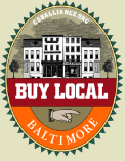Make Your Own, Custom 10-Things List

This is the first in a series of posts that will preview some aspect of my upcoming FR*EE teleclass “How to Overcome Green Overload in Your Small Business: 5 Steps for Cutting Through the Clutter.” At the end of this post, there is a bit more detail about the class.
The other day I had a conversation with a client who was rationally trying to decide where to go next in greening her household, which she rightly thinks of as a small business. Having effectively reduced her family’s energy use, she now wants to turn to their diet. She’s weighing all the options, to decide what actions might be feasible, based on their preferences, schedules, and budget.
She got on the subject of industrial agriculture and its terribly negative impacts on the Chesapeake Bay. For example, in the past, farmers were pressured by the chicken industry to produce vast quantities of chicken as cheaply as possibly, despite pollution and health risks. We can easily become paralyzed by worry and overwhelm from the messages we get in the media about how bad things are and especially our role in the destruction.
These messages speak to our inner sense of shame, turmoil, guilt, and anxiety. And it’s paralyzing because we don’t like feeling that way, so we tend to push away and avoid the subject. And rightly so – these dark feelings are a survival technique, part of how we are designed and wired. The problem is, we cannot act effectively from a place of negativity and avoidance.
During the call, I advised her to focus on things she really likes doing. Pass up the actions that blow her schedule, require her to drive a lot, or completely overhaul her family’s eating habits. Even if she did implement some dramatic changes, they would be at great cost and so would be only short-term fixes without lasting power in their lives. They would eventually drop them, because they are just too hard to maintain over the long haul.
A lot of messages about going green are genuinely helpful lists of things you should be doing – emphasis on the word, “should.” Rather than trying to conform to somebody else’s list of “shoulds,” it’s a much more fruitful and enjoyable exercise to notice, in looking at one of those lists, what things pop out, which appeal to you and which are simply irrelevant.
Start with the things that appeal to you, and start small. Small changes can ripple through with big effects. For instance, if you are thinking about not eating meat altogether, for health, environmental, or even spiritual reasons, the best way to start could be to cut out meat one meal a week or one day a week. (This site, Meatless Monday, is a great resource.) That gives you the experience of planning, preparing, and eating a meatless meal. It allows you to test-drive that change, rather than making it wholesale across the entire week.
This way of customizing green actions from a place of desire, rather than obligation, is one aspect of my upcoming FR*EE teleclass, “How to Overcome Green Overload in Your Small Business: 5 Steps for Cutting Through the Clutter.” This call is on Thursday, Nov. 12, at 4:00 p.m. EST. I’ll show you how to:
• Bring your desire to go green into alignment with your need to grow your business;
• Create new opportunities for your business by going green; and
• Find reliable yet innovative eco-friendly resources
There’s just so much information out there, and I will teach how to put on a pair of green-colored glasses. How to see through all the clutter to the strategies, goals, and vision that really fit you, that are uniquely tailored to your needs, your business, your life.





 View the dynamic, moving GOforChange: Greening Baltimore video
View the dynamic, moving GOforChange: Greening Baltimore video
